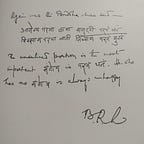Secularism has been in the news for quite some time and is likely to occupy the discourse a bit longer. Nevertheless, it’s an important conversation to have. But the argument on secularism inevitably is centered around interfaith marriages most often. This is not to argue that it’s not an important issue. Muslims, in my opinion, have a tough time standing up to majoritarianism. However, there is an important dimension of Indian secularism that often goes missing out of the discourse on secularism.
The basic tenet of Indian secularism is Freedom of Religion i.e. the right to “profess, practice and propagate” the religion of one’s choice. The moot question here is, has the Bahujan, as an individual been able to exercise their rights fully?
As a matter of lived experience, I have come across many family members, friends, and acquaintances who had to conform to the majoritarian religion legally, in order to avail reservation benefits. Dalit Christians and Muslims are not legally allowed the opportunity to avail reservation and according to me, this curtails their choice to practice a religion of their choice and yet to be connected to the history of their struggles.
The question of conversion is an incredibly difficult channel for Dalits to navigate. Pasmanda struggles are not recognized enough to address their grievances. Most of the discourse limits them to their identity as Muslims while their identity as Bahujans is actively downplayed. A year ago, when many of us addressed Dr. Payal Tadvi as a Muslim and a Scheduled Tribe, she and her family were unfairly shamed despite a tragedy at play. Their access to reparations is mostly OBC reservations and not SC/ST reservations, while their experience and exposure to untouchability continue unabated. Worse, a Dalit Muslim doesn’t get to hide their religion, unlike a Dalit Christian. This leaves them vulnerable to both
That said, I have personally come across many Dalit Christians who identify themselves as scheduled caste Hindus, legally. They are under constant vigil to not expose themselves to any unfair scrutiny. This makes one wonder if freedom of religion for the Bahujan is indeed realized as a fundamental right as enshrined in the Constitution. Both within and outside the community, there’s a sense of hostility to those who convert to other religions and I’ve witnessed all too often a sense of antagonism between different religious groups within the community.
Although I don’t recommend people not to debate these issues pertaining to religion, I feel a sense of benevolence is missing within us. Dalit Christians are most of the time ridiculed as rice bag converts by Savarna Hindus. This has, of late has found some endorsement from middle castes I’ve observed, which obviously is very unfortunate and unacceptable.
The question of conversion and religious freedom of the Bahujan is not dealt with sensibly, either by the state or society. While the state puts limitations to your claim for reparations, the society ridicules and puts you under the duress of maintaining the status quo for a religion that has continued to oppress you for generations.
I had an honest conversation with my parents recently and made it clear that I don’t subscribe to a religion that subjected us to this humiliation and oppression, anymore. They seem to have made peace with this fact. I’m searching for that missing piece in my life, a religion that I could connect to. My heart, at the moment, tells me it’s probably Navyana Buddhism. I’m taking my time to understand religion. A friend had recently started a conversation about Christianity. I’m not sure. But you never know.
I hope the fundamental right to “freedom of religion” is exercised adequately by us Bahujans and may we fight to realize the real potential of this right, to achieve liberation and emancipation from the Brahmanical model of governance that continues to create barriers to our inclusion in the mainstream.
Dr. Ambedkar showed us the way through Dhammachakra Pravartan at Dikshabhoomi 64 years ago. I hope I personally embrace the path shown by him and find my religion that doesn’t make me feel alienated and detached.
The conversations about secularism and religious freedom must outgrow the Hindu-Muslim binary without downplaying islamophobia and center the Bahujan in this discussion. For it’s the Bahujan who bears the brunt of majoritarian religious ideology. Even of Islamophobia, it’s the Bahujan converts who bear the disproportionate damage of mob violence and communal violence. And the state on its part, if keen on proving its secular credentials, must ensure it doesn’t put barriers on us to exercise our freedom of religion.
